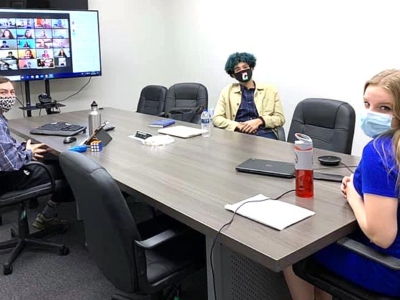Juneteenth in Yellow Springs — A tribute to emancipation
- Published: June 20, 2019
On June 19, 1865, Gen. Gordon Granger of the Union Army stood on a balcony in Galveston, Texas, and shouted down to the enslaved people of the city the news that had been kept from them in the two years since the Emancipation Proclamation had been signed and the two months since the Civil War had ended — that they were no longer enslaved. In the years that followed that announcement, June 19, or Juneteenth, was observed as a day to celebrate the emancipation of enslaved African Americans, initially only in Texas, and eventually all over the nation. Yellow Springs will join the rest of the country in celebrating Juneteenth on two occasions this month.
The first of the two celebrations will be held Saturday, June 15, 2–5 p.m., at Mills Park Hotel. The celebration is coordinated by villager Carmen Lee through her event planning business, Yokel. Lee said her family didn’t really celebrate Juneteenth when she was growing up, but that it was always something that interested her.
“A lot of communities do celebrate [Juneteenth],” she said. “There are parades, there are rodeos — big events that commemorate that day in Texas. I’ve been playing around with the idea of planning something in the village for a couple of years.”
Despite her lack of family connection to the holiday, Lee thinks it’s important for more people to engage with its history, and with the history of slavery itself.
Lee’s own family’s history in Ohio began in 1822 when her great-great-great-great grandfather, Godfrey Brown, bought himself and 15 other people, including his wife and children, out of slavery in Virginia. He and his family founded the 254-acre Brown Settlement in Caesarscreek Township, between present-day Xenia and Waynesville.
Lee said that her family’s story is not atypical of other experiences of escaping slavery.
“It’s special, but it’s not miraculous. People were finding ways,” she said.
The Juneteenth celebration, which will feature music, history and food — some of which Lee, who is also a caterer, will be providing herself — is a fundraiser for the reinstitution of Help Us Make a Nation, or H.U.M.A.N., a local nonprofit group that was incorporated in 1978. Lee said that the group, which has been defunct since the mid-’80s, was crucial to her understanding of community during her formative years in the village.
“If someone needed an oil change, or gutters cleaned, H.U.M.A.N. made sure it was done,” she said. “If they needed food or help paying rent, it was taken care of. I think H.U.M.A.N. operated as a kind of safety net for people who would otherwise have slipped through the cracks.”
In addition to the ways it cared for villagers, Mike Miller, one of H.U.M.A.N.’s original board members, said the nonprofit’s primary focus was addressing systemic racism. Miller will speak on the state of the revived H.U.M.A.N., as part of the celebration’s proceedings.
“Our contention was — and is — that racism is what allows all the other ‘isms’ to take place,” he said.
One of H.U.M.A.N.’s co-founders, Dr. Jim Dunn, went on to co-found The People’s Institute for Survival and Beyond, an activist institute that provides anti-racism training and supports anti-racist organizers. Miller sees the institute as H.U.M.A.N.’s nationally aimed legacy.
“They’ve trained about a million people,” he said. “That’s the evolution of what H.U.M.A.N. did here.”
Miller said that bringing Juneteenth and H.U.M.A.N. together seemed natural, not only because of the holiday’s significance and the nonprofit’s social justice goals, but because it’s the kind of thing H.U.M.A.N. historically did.
“H.U.M.A.N. made a habit of periodically throwing some kind of community event,” Miller said.
Lee, who works at Mills Park Hotel as a barista, has planned for the Juneteenth celebration to be held on the hotel’s front porch. When asked, she said that she understands the possible optics of hosting the event, which notes the history of slavery, in a building that some villagers have decried over the years as looking similar to a plantation house. However, she considers the history attached to the house after which the hotel was modeled to be more important than the way the hotel looks.
“It looks like a plantation house in that it’s a big, white building — that’s just the architecture,” she said. “But it’s a replica of the house of William Mills, who was an abolitionist. My mom went to preschool in that house, which was right across the street.”
Mills Park Hotel donated the use of the space for the event. Aside from that, however, Lee she said there’s a personal reason why she wanted to use the hotel as the host of the event.
“When I first started working here, I was just checking out the digs one day, and I saw an old map of the Miami Valley area hanging on the wall,” she said.
On the map, which was issued in the mid-to-late 19th century, she saw, right in Caesarscreek Township, a notation for “Africa M.H.,” or “African Meeting House” — this was how the mapmakers, and governing bodies of the day had referred to Middle Run Baptist Church, the church her ancestor Godfrey Brown founded and pastored. The church still operates, though it’s now located in Xenia.
“That’s part of my history on the wall,” she said.
History, of course, is important to the celebration itself, and to that end, Antioch College Associate Professor of History Kevin McGruder will speak on the history of Juneteenth and its first celebrators at the June 15 event.
McGruder pointed out in an interview this week that, when the news of freedom finally reached enslaved African Americans in Texas from whom it had been withheld, despite the tragedy inherent in the delay, the overwhelming reaction was one of joy.
“The people who received that information decided not to dwell on the tragic side of things and created what really was a community celebration,” McGruder said.
But during Reconstruction, celebrating Juneteenth became increasingly difficult, according to McGruder.
“White people in the south became hostile to the celebrations, so Black people bought their own land so that they could celebrate Juneteenth,” he said.
Emancipation Park in Houston, Texas, for example, was purchased in 1872 for that purpose. It’s the oldest park in the state of Texas.
McGruder said that, as the generation of African Americans who were born into slavery died, Juneteenth celebrations fell out of favor, but during the Civil Rights era, they enjoyed a revival. Now, it’s celebrated worldwide.
After the June 15 event, Juneteenth will be celebrated again on Wednesday, June 19 — the actual date of Juneteenth — beginning at 6 p.m. at First Baptist Church. The annual celebration, which is open to the public and is jointly hosted by First Baptist and Central Chapel AME Church, has been held since 2013, when it was organized in part by McGruder.
McGruder said that part of the reason he started the celebration was because he had recently co-authored a book, “Emancipation Proclamation: Forever Free,” for the 150th anniversary of the signing of the proclamation.
Each year’s celebration focuses on a different historical theme connected to Black history, and this year’s event, said McGruder, will focus on African kings and queens.
McGruder acknowledged that some people might find that odd, but that it challenges the narrative, developed by Europeans, that Africans “came from a dark continent with nothing.”
“Juneteenth is definitely a celebration of freedom — but Black people had millennia of freedom before coming in contact with the transatlantic slave trade,” McGruder said. “Talking about the kings and queens allows us to talk about that freedom and where enslaved peoples came from and their rich history.”
The presentation at the Baptist Church will cover 16 men and women from different eras in the history of African nations, from Egyptian pharaohs to those who fought against the European invasion and enslavement of Africans.
McGruder also dispelled the commonly accepted narrative that the signing of the Emancipation Proclamation by Abraham Lincoln instantly freed all the slaves. McGruder described it as a misunderstanding of the complex history of the subject. To begin with, the proclamation only allowed for the freedom of those enslaved in Confederate states as of Jan. 1, 1863 — this did not include those enslaved in Kentucky, Delaware, Maryland and Missouri. Furthermore, since the Confederate states did not accept the authority of the Union government, the executive order couldn’t be enforced in those areas.
“So, during the war, Lincoln had no power to free anybody [in the Confederate states],” said McGruder. “But it did inspire enslaved people to seek their own freedom.”
After the Confederacy surrendered on April 9, 1865, and the Civil War was ended, slaves in the former Confederate states, including Texas, were, by Lincoln’s order, no longer enslaved. Those enslaved in states not in the Confederacy would have to wait until December of that year for their official freedom, when the 13th Amendment abolishing slavery was ratified.
When asked about the nature of Juneteenth, and the question of why and how an entire state’s worth of enslaved people were kept in the dark about their freedom, McGruder said there’s no mystery to consider.
“I don’t think it requires a complex theory — slavery made a lot of money,” he said. “The information was withheld intentionally. It was about money and it was about violence. I think it’s an example of the intractable nature of white supremacy.”
“If we can understand that, then we can understand why Black people have had to fight so hard for equality.”
Yokel will host its Juneteenth celebration and fundraiser on Saturday, June 15, 2 p.m.–5 p.m., at Mills Park Hotel. Tickets are $20. For more information, visit http://www.eventbrite.com and search “JuneteenthYS.”
First Baptist Church and Central Chapel AME Church will host their annual Juneteenth celebration on Wednesday, June 19, beginning at 6 p.m., at First Baptist Church. The historical presentation will be followed by a potluck meal; those attending are encouraged to bring a side dish or dessert, and the main dish will be provided. All are welcome.
The Yellow Springs News encourages respectful discussion of this article.
You must login to post a comment.
Don't have a login? Register for a free YSNews.com account.

Parkinsons.jpg)













No comments yet for this article.